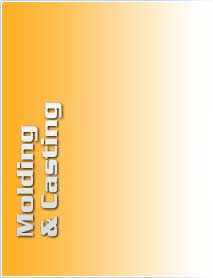At Tech, Inc., we present multiple types of molding and casting techniques. Our Molding & Casting technologies have proven extremely beneficial to our clients; for example, plastic molded or cast parts are capable of being used to:
- Fill the manufacturing gap until production tooling is completed
- Create multiple parts for testing
- Demonstrate conceptual models
- Produce durable representative and functional models.
- Prepare rapid and inexpensive test assemblies
- Develop investment cast patterns
- Offer sales and marketing demos
All of the molding and casting processes offered at Tech, Inc. are used to produce fairly quick prototypes or short-run production parts. The materials used to develop your model depend on your requirements; contact Tech, Inc. for recommendations. Below are the molding and casting technologies at Tech, Inc.
Room Temperature Vulcanization (RTV) Molding
The fastest, most precise, and most cost-effective method to create one to hundreds of replications of a prototype part is Room Temperature Vulcanization (RTV) Molding. These silicone molds can have similar material properties, thermal properties, color and surface texture properties to production parts. Read more
here.
Direct Aim
For investment cast parts, Direct Aim silicone molding may be the most cost-effective option. The development process of Direct Aim molding creates a durable tool with increased production capacity. Read more
here.
Machined and Durable Tooling
While the lead-time for creating these molds is typically a little longer, they can still be created faster than conventional injection mold tooling. Materials for this process include urethanes, silicones, Epoxies, wax, and foam. Read more
here.
Epoxy Molding
A high-strength mold can be created in a reasonable amount of time with a master pattern or rapid prototype in Epoxy Molding. Although not as flexible as RTV molds, Epoxy molds are a relatively inexpensive method to produce prototypes. Read more
here.
Parts Masking
Masking your parts can protect critical production areas in your operations. Instead of throwing away money on traditional protective measures like tape, masking can protect your part from both mechanical and chemical sources. Read more
here.
Contact Tech, Inc. for suggestions and recommendations concerning your molding and casting requirements.



